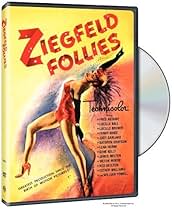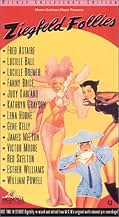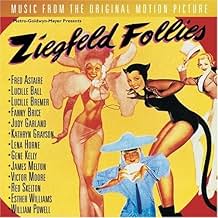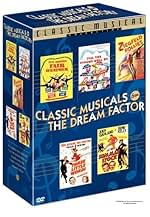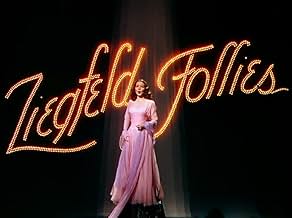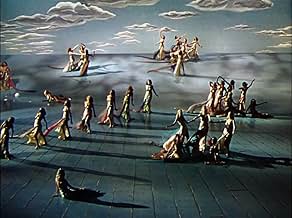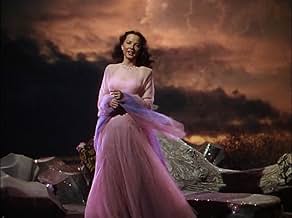Ziegfeld Follies
- 1945
- Tous publics
- 1h 50min
NOTE IMDb
6,4/10
3,9 k
MA NOTE
Le regretté grand imprésario Florenz Ziegfeld Jr. regarde du ciel et décrète une nouvelle revue dans son grand style ancien.Le regretté grand imprésario Florenz Ziegfeld Jr. regarde du ciel et décrète une nouvelle revue dans son grand style ancien.Le regretté grand imprésario Florenz Ziegfeld Jr. regarde du ciel et décrète une nouvelle revue dans son grand style ancien.
- Récompenses
- 1 victoire et 1 nomination au total
Avis à la une
If a star-studded Hollywood cast from the 'Golden' years makes you enjoy a film, that alone will be enough to tide you over the nearly 2 hours of this musical bonanza. It seems nearly everyone is present.
True to the nature of the revue, there's no story and just a series of vignettes that come and go. Among them, Fred Astaire and Gene Kelly have a dance show-off, your only chance to see one from this time. Esther Williams gives us a lovely underwater ballet, I would like to see more of her.
In spite of the scale of the production, the lavish sets and elaborate costumes, this is not, of course, aristocratic entertainment for those with a refined taste in music and dance but low brow frill aimed at the broad audience.
The revue was television of its time - an opportunity to shift among a few fluffy entertainments after a long day, nothing demanding our engagement beyond the few minutes of a skit. These days it seems to survive in SNL. The bits here alternate between broad comedy skits and song and dance numbers.
It's not bad, not particularly great either. It's not what I look for in a musical, and I will always opt for the fuller engagement of long narrative.
More interesting for me here are all the self-referential bits.
In the Astaire/Kelly show-off Fred, established musical royalty, plays a joke of pretending to not know who Kelly is.
Judy Garland enters her segment as herself, musing to a chorus of reporters about preferring song and dance roles rather than dramatic.
These people are here as themselves, the veneer of fiction is thin, opportunity for scenery and costume. You'll see some gorgeous examples of both, among the standouts for me being the all red ballroom in which Astaire swindles the rich countess and the dreamy finale, with chorus girls swirling through billows of bubbly foam. Briefly glimpsed among them is Cyd Charissee in her first appearance.
The whole is framed as Ziegfeld in heaven reminiscing about the shows he put on.
My favorite bit is the Chinatown skit with Astaire as a poor coolie dreaming about a woman he passes by on the street. His unrequited love becomes a dance they have together holding hand fans.
True to the nature of the revue, there's no story and just a series of vignettes that come and go. Among them, Fred Astaire and Gene Kelly have a dance show-off, your only chance to see one from this time. Esther Williams gives us a lovely underwater ballet, I would like to see more of her.
In spite of the scale of the production, the lavish sets and elaborate costumes, this is not, of course, aristocratic entertainment for those with a refined taste in music and dance but low brow frill aimed at the broad audience.
The revue was television of its time - an opportunity to shift among a few fluffy entertainments after a long day, nothing demanding our engagement beyond the few minutes of a skit. These days it seems to survive in SNL. The bits here alternate between broad comedy skits and song and dance numbers.
It's not bad, not particularly great either. It's not what I look for in a musical, and I will always opt for the fuller engagement of long narrative.
More interesting for me here are all the self-referential bits.
In the Astaire/Kelly show-off Fred, established musical royalty, plays a joke of pretending to not know who Kelly is.
Judy Garland enters her segment as herself, musing to a chorus of reporters about preferring song and dance roles rather than dramatic.
These people are here as themselves, the veneer of fiction is thin, opportunity for scenery and costume. You'll see some gorgeous examples of both, among the standouts for me being the all red ballroom in which Astaire swindles the rich countess and the dreamy finale, with chorus girls swirling through billows of bubbly foam. Briefly glimpsed among them is Cyd Charissee in her first appearance.
The whole is framed as Ziegfeld in heaven reminiscing about the shows he put on.
My favorite bit is the Chinatown skit with Astaire as a poor coolie dreaming about a woman he passes by on the street. His unrequited love becomes a dance they have together holding hand fans.
Ziegfeld Follies is a musical comedy from 1946, from the time when they made lots of musical movies.There really isn't a plot in this movie, but who needs one anyway.As long the musical numbers are working, you really don't need a plot in a movie like this.And then there are also some really funny sketches in the movie.Especially I liked Red Skelton's and Keenan Wynn's acts.They really make you laugh.And then it is great fun to watch Fred Astaire's and Gene Kelly's musical number.This was their only musical act together.Ziegfeld Follies has many great musical numbers.The younger generation doesn't care so much about musical movies, but I'm a teen ager and I like these old musical movies.These kind of movies make me miss those times, and I wasn't even born back then!
Let's give this movie credit for one thing: it doesn't claim to be anything other than what it is: an unconnected series of musical numbers and comedy sketches, meant to honor the late Florenz Ziegfeld. So, if that is what you want, terrific. If a particular scene bores you, you can fast-forward through it without missing anything.
The strength of the film was the wise decision to let Fred Astaire appear in more than one number. His dancing and on-screen personality are always delightful, because his joy in performing is obvious and catching. The highlight of the movie comes in the last performance, when he performs a wonderful tap-dance and singing number with Gene Kelly. They are so palpably having a good time that you almost forget how dreary so much of the rest of the film was!
The comedy sketches are absolutely the most miserable and un-funny things ever captured on celluloid. Painful, painful, painful. Good grief, do they drag on forever. Keenan Wynn performs an old Vaudeville sketch in which a man cannot get the operator to put his call through to a nearby number, while a parade of other characters have no problem putting calls through to the most obscure and distant locations on the planet. Potentially funny, yes? Well, yes, when Lou Costello did it two years earlier in "Who Done It" - that was the definitive version of the sketch. It is one of the funniest things Lou ever did. Why in the world would MGM have Wynn try to do the same sketch - he tries very hard to mimic Lou Costello's facial contortions and grunts and squeals of frustration - but it stinks.
And the "Pay him the two dollars" routine with Victor Booth and Edward Arnold - well, if this represents Vaudeville at its best, then I guess I don't regret not having been alive to see it after all. And Victor Hume takes a rare stab at comedy too; he appears to be trying to mimic Shemp Howard, and none too well at that.
The musical numbers in general are what you would expect from MGM - lavish, expensive-looking, and otherwise spectacular.
While it may not be everyone's cup of tea, I actually enjoyed the claymation at the beginning of the movie. One of the most bizarre and surreal scenes in any MGM movie ever has to be the 45 seconds of Eddie Cantor, in glorious claymation, and in blackface, for goodness sake, singing "If you knew Susie". It is hilarious, and the claymation really captures Cantor's performance style to a Tee - for comparison, I strongly suggest you watch "A Few Minutes with Eddie Cantor" (1923, in sound) on Youtube.
And speaking of classic Hollywood racial insensitivity, a long "drama in pantomime" features Fred Astaire and as a Chinese, stalking another white actress pretending to be Chinese. You really have to shake your head. And are Fred and Gene dancing in front of a statue of Civil War General Nathan Bedford Forrest? Perhaps not, but he sure looks Confederate....
Like I said, Ziegfeld Follies gives you get exactly what it claims to give you. But have the fast-forward ready.
The strength of the film was the wise decision to let Fred Astaire appear in more than one number. His dancing and on-screen personality are always delightful, because his joy in performing is obvious and catching. The highlight of the movie comes in the last performance, when he performs a wonderful tap-dance and singing number with Gene Kelly. They are so palpably having a good time that you almost forget how dreary so much of the rest of the film was!
The comedy sketches are absolutely the most miserable and un-funny things ever captured on celluloid. Painful, painful, painful. Good grief, do they drag on forever. Keenan Wynn performs an old Vaudeville sketch in which a man cannot get the operator to put his call through to a nearby number, while a parade of other characters have no problem putting calls through to the most obscure and distant locations on the planet. Potentially funny, yes? Well, yes, when Lou Costello did it two years earlier in "Who Done It" - that was the definitive version of the sketch. It is one of the funniest things Lou ever did. Why in the world would MGM have Wynn try to do the same sketch - he tries very hard to mimic Lou Costello's facial contortions and grunts and squeals of frustration - but it stinks.
And the "Pay him the two dollars" routine with Victor Booth and Edward Arnold - well, if this represents Vaudeville at its best, then I guess I don't regret not having been alive to see it after all. And Victor Hume takes a rare stab at comedy too; he appears to be trying to mimic Shemp Howard, and none too well at that.
The musical numbers in general are what you would expect from MGM - lavish, expensive-looking, and otherwise spectacular.
While it may not be everyone's cup of tea, I actually enjoyed the claymation at the beginning of the movie. One of the most bizarre and surreal scenes in any MGM movie ever has to be the 45 seconds of Eddie Cantor, in glorious claymation, and in blackface, for goodness sake, singing "If you knew Susie". It is hilarious, and the claymation really captures Cantor's performance style to a Tee - for comparison, I strongly suggest you watch "A Few Minutes with Eddie Cantor" (1923, in sound) on Youtube.
And speaking of classic Hollywood racial insensitivity, a long "drama in pantomime" features Fred Astaire and as a Chinese, stalking another white actress pretending to be Chinese. You really have to shake your head. And are Fred and Gene dancing in front of a statue of Civil War General Nathan Bedford Forrest? Perhaps not, but he sure looks Confederate....
Like I said, Ziegfeld Follies gives you get exactly what it claims to give you. But have the fast-forward ready.
If you get easily bored with those old movies that seem to roll and roll forever, this is for you. It really has no plot, but you really don't need one. You could call this movie the Grand Ball, because it really is a set of dances. (Except for a few comedy scenes) Overall, I strongly believe that it is a really good movie, especially in those Fred Astaire numbers (Here's to the Girls, This Heart of Mine, and the Limehouse Blues) This movie is a real MUST for classic movie and Ziegfeld lovers alike.
The Ziegfeld Follies were legendary stage shows that consisted entirely of musical numbers and comedy routines performed by some of the greatest stars of the day. When sound began to roar in the late 1920s, the movie studios followed the Ziegfeld form and quickly produced a series of films that were variety-show in nature. But the musical review is a form that really works best on stage before a live audience: in short order the movie-going public turned its back on the style in favor of musicals that offered increasingly complex, sophisticated, and sometimes unexpectedly dark stories.
In the 1940s MGM, famous for its musicals, unexpectedly decided to revive the form--and to do so in the style of producer Florenz Ziegfeld. The result was an outrageous budget that would have made Ziegfeld himself blanch, a wave of imaginative visuals that could have never been crammed onto even the biggest Broadway stage, a host of legendary performers, and the occasional comedy routine for relief from the sheer spectacle of it all.
The big hurdle for modern audiences is the fact that we have become accustomed to variety shows through television; they no longer have a unique appeal and it is difficult for us to sit through two hours of it. Even so, most musical fans will probably find ZIEGFELD FOLLIES worth the effort; although it has a few weak spots, it is easily one of the most visually stunning flights of fancy ever put on the screen.
The weakest links in the chain are the comedy routines, all of which seem insubstantial at best, slightly clunky at worst; still, they are amusing in an old-fashioned sort of way and it is always a pleasure to see the legendary Fannie Brice, no matter how inconsequential the script may be. Fortunately, the film weighs in heavily on the musical side, and while the actual material may be a bit weak at times the look of the thing is absolutely eye-popping.
The opening number is nothing short of stunning: Fred Astaire introduces a riot in pink and black that includes a spinning Cyd Charisse, a turning merry-go-round with real white horses, and a formidable Lucille Ball keeping a host of leopard-like women in check with a whip! Truly, musicals are the most surreal of all performing arts genres, but this seems to stretch the boundaries quite a bit.
The film is filled with notable performers. Virginia O'Brien, the great comic singer, dismisses the ladies in favor of the men--indeed, it seems, almost any man will do. Esther Williams swirls elegantly in front of lavish underwater sets. James Melton and Marion Bell offer memorable performances of the most famous duet from LA TRAVIATA in a memorably designed setting. Katherine Grayson is surrounded by some truly unexpected sets, walls of bubbles, and gold-clad bathing beauties. Certainly no one can complain that there is nothing to see on the screen! Along the way we also have some truly legendary moments, chief among them two amazingly beautiful dance numbers performed by Fred Astaire and Lucille Bremer. The first, "This Heart of Mine," finds Astaire playing a jewel thief bent upon seducing Bremer at a ball: red and white with elaborate costumes, hidden treadmills, and decoratively turning platforms, it is both clever and very elegant. Even so, "Limehouse Blues" is finer still, introducing a mysterious Chinatown--and then suddenly bursting into a fantasia of white and blue and red as Astaire and Bremer dance out a love story that never was and never could ever be.
The film also offers two of MGM's most celebrated singing stars. During her MGM career Lena Horne was typically saddled with excessive movement and frequently peculiar costumes--but both actually work to her advantage here, and her performance of "Love" has tremendous tropical sizzle, to say the least. It may be a bit more difficult for modern viewers to know how to react to Judy Garland's "The Interview," for its references are lost; not only is it very much an industry insider joke, it is very much a take-off on "serious" actresses of the time who specialized in playing biographical roles, with Greer Garson a very specific target. Still, Garland nails it as only Garland can, and that says a great deal indeed.
The film also contains a true rarity: the only serious pairing of Fred Astaire and Gene Kelly, who lightly send up rumors of their rivalry--and then proceed to demonstrate just how truly competitive they could be in some of the finest choreography ever put on the screen. "The Babbit and the Bromide" is truly a remarkable thing to behold; you are constantly torn in your attention between the two men, each with very different styles and yet each truly incomparable.
In spite of its array of stars and remarkable visuals, ZIEGFELD FOLLIES was not among MGM's box-office knockouts of the 1940s and it was rarely seen after its original theatrical release. It is presently available only in VHS, and although the print is good it isn't the best possible--and since the visual spectacle is a prime reason for seeing the show you may want to hold out (and cross your fingers) for a full restoration on DVD. On the other hand, the out-of-print but still available VHS package does include the soundtrack on CD, which is a very strong plus.
Final thought on the film: unless you are a serious fan of MGM musicals you may want to skip this one, but if you are willing to make the act of acceptance the film requires you'll find ZIEGFELD FOLLIES a drop-dead gorgeous show.
Gary F. Taylor, aka GFT, Amazon Reviewer
In the 1940s MGM, famous for its musicals, unexpectedly decided to revive the form--and to do so in the style of producer Florenz Ziegfeld. The result was an outrageous budget that would have made Ziegfeld himself blanch, a wave of imaginative visuals that could have never been crammed onto even the biggest Broadway stage, a host of legendary performers, and the occasional comedy routine for relief from the sheer spectacle of it all.
The big hurdle for modern audiences is the fact that we have become accustomed to variety shows through television; they no longer have a unique appeal and it is difficult for us to sit through two hours of it. Even so, most musical fans will probably find ZIEGFELD FOLLIES worth the effort; although it has a few weak spots, it is easily one of the most visually stunning flights of fancy ever put on the screen.
The weakest links in the chain are the comedy routines, all of which seem insubstantial at best, slightly clunky at worst; still, they are amusing in an old-fashioned sort of way and it is always a pleasure to see the legendary Fannie Brice, no matter how inconsequential the script may be. Fortunately, the film weighs in heavily on the musical side, and while the actual material may be a bit weak at times the look of the thing is absolutely eye-popping.
The opening number is nothing short of stunning: Fred Astaire introduces a riot in pink and black that includes a spinning Cyd Charisse, a turning merry-go-round with real white horses, and a formidable Lucille Ball keeping a host of leopard-like women in check with a whip! Truly, musicals are the most surreal of all performing arts genres, but this seems to stretch the boundaries quite a bit.
The film is filled with notable performers. Virginia O'Brien, the great comic singer, dismisses the ladies in favor of the men--indeed, it seems, almost any man will do. Esther Williams swirls elegantly in front of lavish underwater sets. James Melton and Marion Bell offer memorable performances of the most famous duet from LA TRAVIATA in a memorably designed setting. Katherine Grayson is surrounded by some truly unexpected sets, walls of bubbles, and gold-clad bathing beauties. Certainly no one can complain that there is nothing to see on the screen! Along the way we also have some truly legendary moments, chief among them two amazingly beautiful dance numbers performed by Fred Astaire and Lucille Bremer. The first, "This Heart of Mine," finds Astaire playing a jewel thief bent upon seducing Bremer at a ball: red and white with elaborate costumes, hidden treadmills, and decoratively turning platforms, it is both clever and very elegant. Even so, "Limehouse Blues" is finer still, introducing a mysterious Chinatown--and then suddenly bursting into a fantasia of white and blue and red as Astaire and Bremer dance out a love story that never was and never could ever be.
The film also offers two of MGM's most celebrated singing stars. During her MGM career Lena Horne was typically saddled with excessive movement and frequently peculiar costumes--but both actually work to her advantage here, and her performance of "Love" has tremendous tropical sizzle, to say the least. It may be a bit more difficult for modern viewers to know how to react to Judy Garland's "The Interview," for its references are lost; not only is it very much an industry insider joke, it is very much a take-off on "serious" actresses of the time who specialized in playing biographical roles, with Greer Garson a very specific target. Still, Garland nails it as only Garland can, and that says a great deal indeed.
The film also contains a true rarity: the only serious pairing of Fred Astaire and Gene Kelly, who lightly send up rumors of their rivalry--and then proceed to demonstrate just how truly competitive they could be in some of the finest choreography ever put on the screen. "The Babbit and the Bromide" is truly a remarkable thing to behold; you are constantly torn in your attention between the two men, each with very different styles and yet each truly incomparable.
In spite of its array of stars and remarkable visuals, ZIEGFELD FOLLIES was not among MGM's box-office knockouts of the 1940s and it was rarely seen after its original theatrical release. It is presently available only in VHS, and although the print is good it isn't the best possible--and since the visual spectacle is a prime reason for seeing the show you may want to hold out (and cross your fingers) for a full restoration on DVD. On the other hand, the out-of-print but still available VHS package does include the soundtrack on CD, which is a very strong plus.
Final thought on the film: unless you are a serious fan of MGM musicals you may want to skip this one, but if you are willing to make the act of acceptance the film requires you'll find ZIEGFELD FOLLIES a drop-dead gorgeous show.
Gary F. Taylor, aka GFT, Amazon Reviewer
Le saviez-vous
- AnecdotesAt the beginning of the "Bring On The Beautiful Girls" number, several older women are shown; these are women who actually appeared in the original Ziegfeld Follies on stage.
- GaffesTowards the end of "This Heart of Mine", as Fred Astaire and Lucille Bremer begin to dance back to the palace, dancers in the background (screen left) struggle to stabilize some of the antler-tree props.
- Citations
Florenz Ziegfeld Jr.: Children play with the dreams of tomorrow. And old men play with the memories of yesterday.
- Crédits fousZiegfeld Follies credits are in alphabetical order. That is why "Bunin" comes before "Charisse"
- Versions alternativesThere is an Italian edition of this film on DVD, "FOLLIE DI ZIEGFELD", re-edited in double version (1.33:1 and 1.78:1) with the contribution of film historian Riccardo Cusin This version is also available for streaming on some platforms.
- ConnexionsEdited into Hollywood: The Dream Factory (1972)
- Bandes originalesHere's to the Girls
Music by Roger Edens
Lyrics by Arthur Freed
Sung by Fred Astaire, chorus
Danced by Cyd Charisse, Lucille Ball, chorus
Meilleurs choix
Connectez-vous pour évaluer et suivre la liste de favoris afin de recevoir des recommandations personnalisées
- How long is Ziegfeld Follies?Alimenté par Alexa
Détails
- Date de sortie
- Pays d’origine
- Langue
- Aussi connu sous le nom de
- Ziegfeld Follies of 1944
- Lieux de tournage
- Société de production
- Voir plus de crédits d'entreprise sur IMDbPro
Box-office
- Budget
- 3 240 816 $US (estimé)
- Durée1 heure 50 minutes
- Couleur
- Rapport de forme
- 1.37 : 1
Contribuer à cette page
Suggérer une modification ou ajouter du contenu manquant


